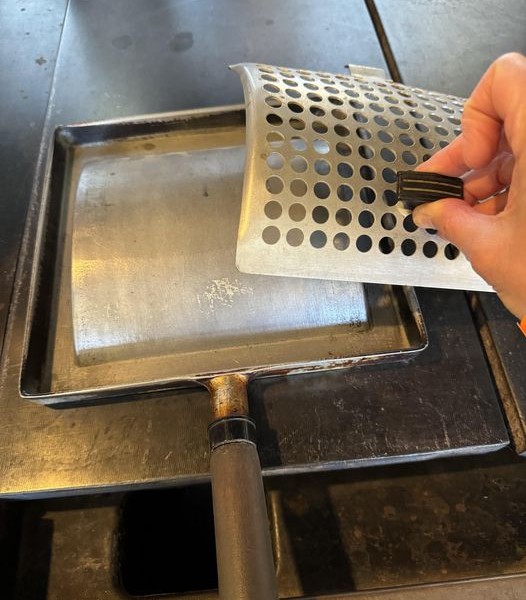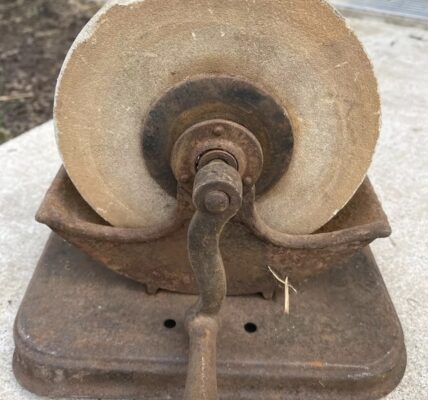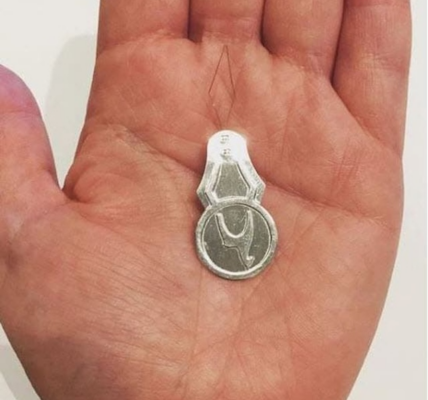A 6-inch square kitchen implement, made from metal with a possibly bone handle, was located on a stove in an early 1900s American home.-s1
In the vast collection of kitchen tools from the past, few items evoke as much nostalgia and curiosity as the vintage bacon grill. This small, 6-inch square kitchen implement, often made from metal and sometimes featuring a bone handle, was a staple in many American homes during the early 1900s. Placed prominently on the stove, this seemingly humble gadget revolutionized the way families prepared breakfast, particularly their beloved bacon. But what exactly made this tool so significant? Let’s take a journey through time and explore the history, design, and legacy of the vintage bacon grill.
What Was a Bacon Grill? A Glimpse into Early American Kitchens

The vintage bacon grill may appear simple at first glance, but in its day, it was a marvel of kitchen innovation. Designed to cook bacon with ease and efficiency, this tool featured a flat metal surface adorned with raised ridges. These ridges allowed grease to drain away from the meat, ensuring that the bacon cooked evenly and remained delightfully crispy—qualities every bacon lover still seeks today.
Unlike modern non-stick pans or electric grills, the bacon grill was entirely manual, relying on the heat from a stove to work its magic. And although it was primarily used for bacon, its versatility extended to cooking other meats and even vegetables. Early 20th-century households prized this tool not only for its functionality but also for its durability. The combination of metal and sometimes bone handle craftsmanship ensured that these grills would last for years, often being passed down through generations.
A Brief History of the Bacon Grill’s Popularity
The bacon grill gained widespread use in American kitchens around the late 1800s and early 1900s. During this time, home-cooked breakfasts were the norm, and bacon quickly became a beloved staple on the breakfast table. However, frying bacon directly on a pan often led to a greasy mess and inconsistent cooking. The bacon grill emerged as the solution to these common kitchen woes.
Its compact size made it ideal for stovetop use, while its ridged surface ensured the grease drained away, leaving behind perfectly crisp bacon strips. The design was simple but effective—no need for advanced technology or electricity, just a straightforward tool that worked. By the mid-20th century, as the American breakfast ritual became more ingrained in daily life, the bacon grill had found its permanent place in homes across the country.
The Design: A Blend of Functionality and Durability
What made the vintage bacon grill so effective? Let’s break down its design.
The grill’s ridged surface was key to its success. Unlike a smooth pan, these ridges elevated the bacon above its own grease as it cooked. This meant that instead of sitting in a pool of fat, the bacon would crisp up evenly while the excess grease dripped away. This not only resulted in a better texture but also made the final product slightly less greasy—an important feature in an era where health-conscious cooking wasn’t yet mainstream but was slowly gaining attention.
Additionally, some versions of the bacon grill came equipped with a lid, which trapped heat and cooked the bacon from both sides, reducing the need for flipping and speeding up the process. The small, portable nature of the grill made it easy to store, and its simple design made it easy to clean—a blessing for busy homemakers.
How the Bacon Grill Was Used: A Staple in Daily Breakfasts
The process of using a bacon grill was straightforward. After preheating it on the stove, cooks would place the bacon strips directly on the ridged surface. The grill was then covered with a lid (if available), and as the bacon sizzled, the grease would drain off, collecting in a separate tray or on the stove. This method allowed for more consistent cooking and a less messy cleanup compared to traditional frying.
Beyond bacon, the grill proved itself as a versatile tool. Home cooks would use it to prepare sausages, ham, and even vegetables. Its multifunctional nature made it an essential part of early 20th-century kitchens, where tools were expected to serve multiple purposes.
The Legacy of the Vintage Bacon Grill

While today’s kitchens are filled with electric gadgets and high-tech appliances, the vintage bacon grill remains a symbol of simpler times. Its sturdy, reliable design allowed families to enjoy delicious, crispy bacon without the fuss of modern machinery. For collectors and vintage kitchenware enthusiasts, finding an original bacon grill with a bone handle is akin to uncovering a piece of culinary history.
What makes these grills even more special today is their connection to family traditions. Many people recall stories of their grandparents or great-grandparents using these grills on a wood-fired or gas stove, turning out perfect strips of bacon for family breakfasts. These memories give the vintage bacon grill a sentimental value that transcends its practical use.
Why Vintage Kitchen Tools Still Matter Today
In recent years, there has been a resurgence in the appreciation of vintage kitchenware. Collectors and home cooks alike are drawn to these items not only for their durability but also for the nostalgia they evoke. The vintage bacon grill, with its charmingly simple design and effective functionality, represents an era when home-cooked meals were cherished traditions, and every kitchen tool had a purpose.
In today’s world of fast food and microwave meals, tools like the bacon grill remind us of the joys of slow cooking, the value of craftsmanship, and the importance of family meals. Whether passed down through generations or found in antique shops, the vintage bacon grill continues to hold a special place in the hearts of those who appreciate its history.
Conclusion: A Timeless Tool for Bacon Lovers
The vintage bacon grill is more than just a kitchen implement—it’s a piece of American history. Its unique design, practical usage, and lasting legacy have made it a treasured item in many homes, whether used for cooking or simply displayed as a conversation starter. This 6-inch metal square with a possibly bone handle is a reminder of a time when cooking was an art, and every meal was an occasion.
As we look back on this ingenious little tool, we can’t help but appreciate the simple yet effective solutions our ancestors used to create delicious food. The bacon grill may no longer be a common sight in modern kitchens, but its legacy lives on, reminding us of the joys of a perfectly crispy piece of bacon shared around the breakfast table.




